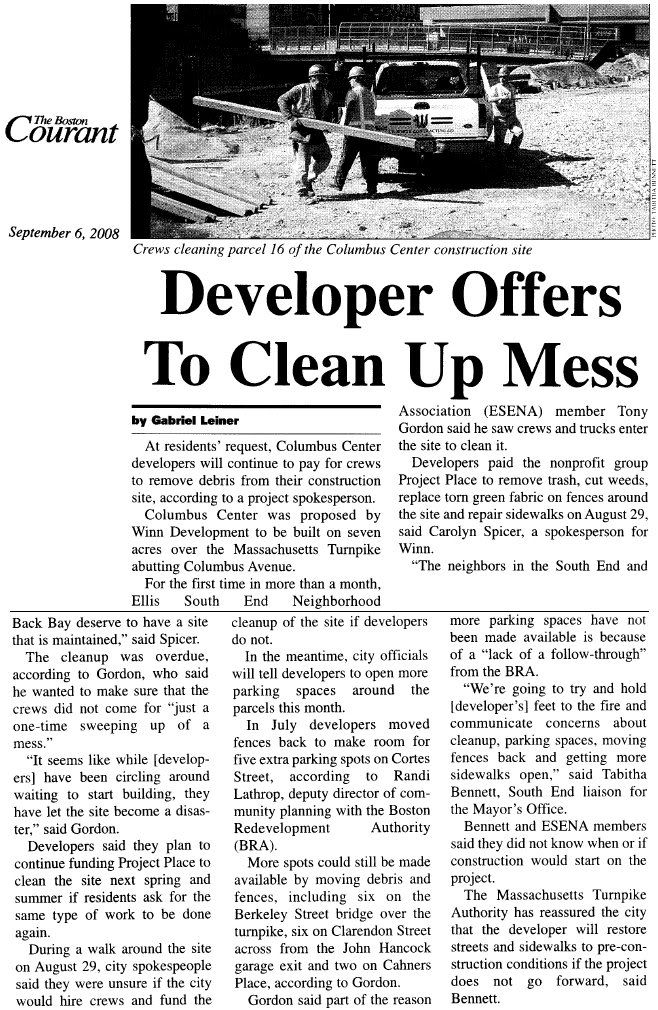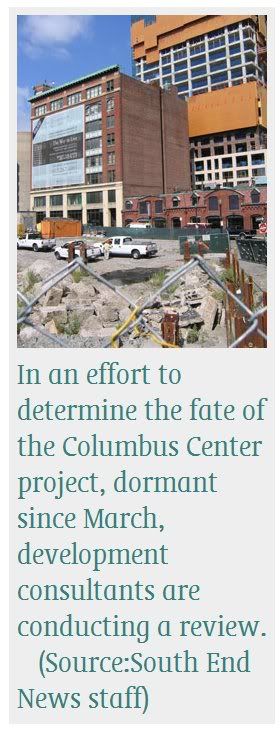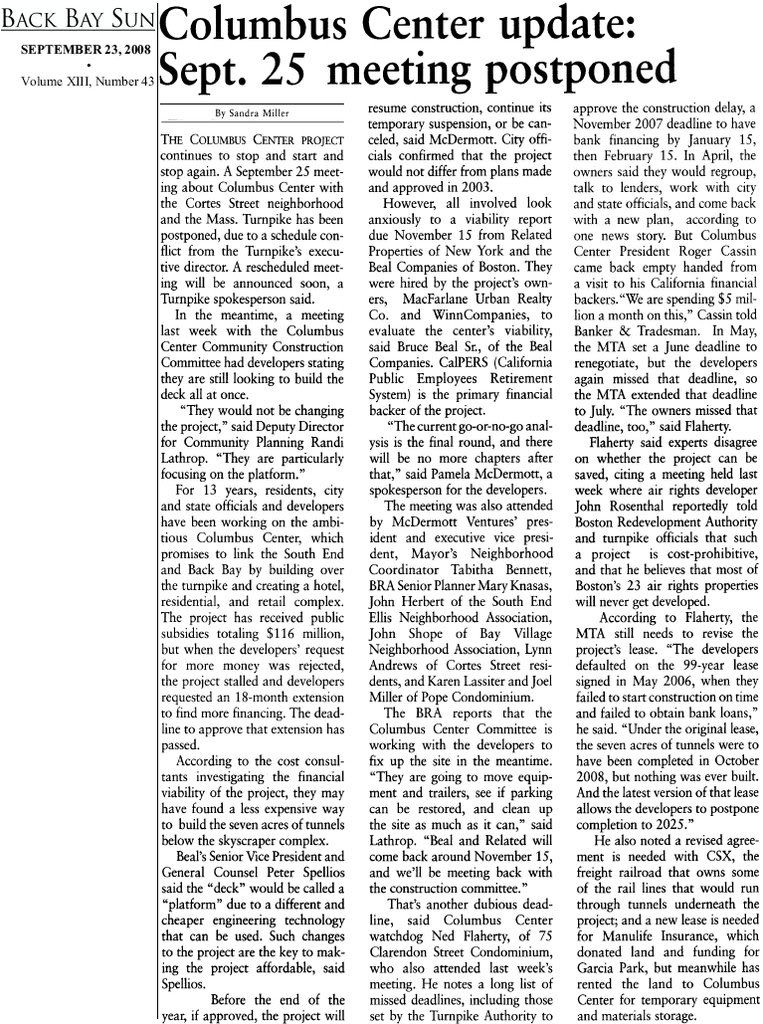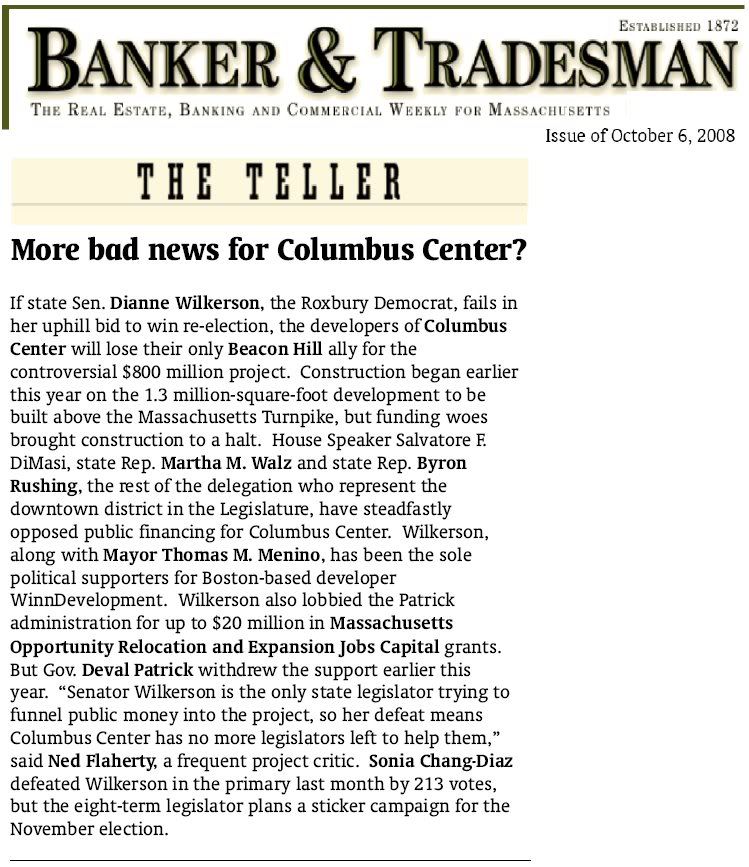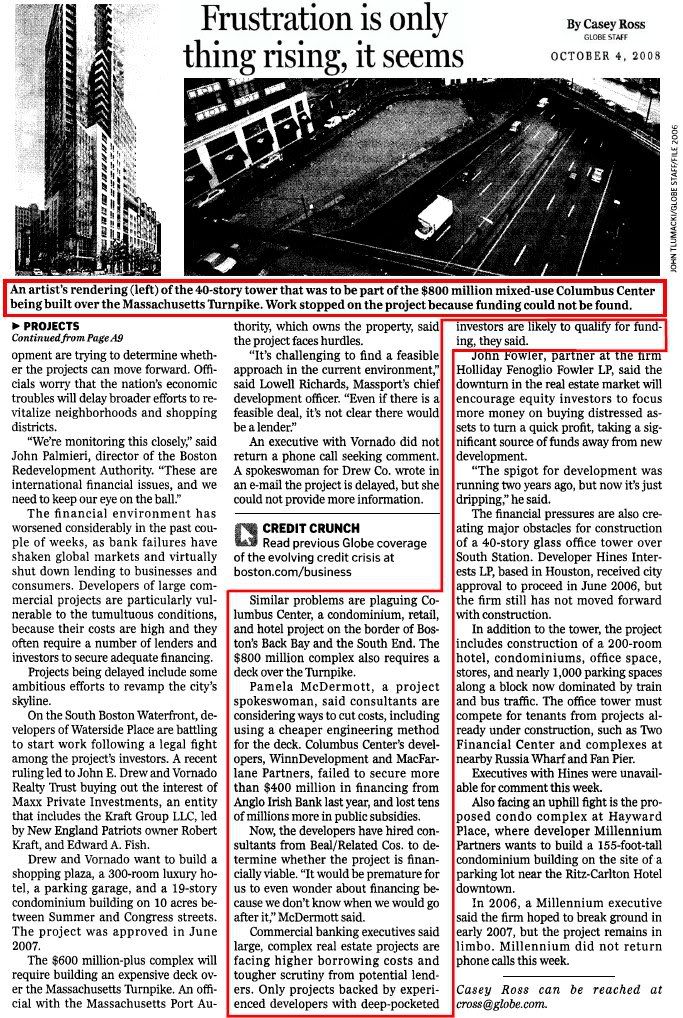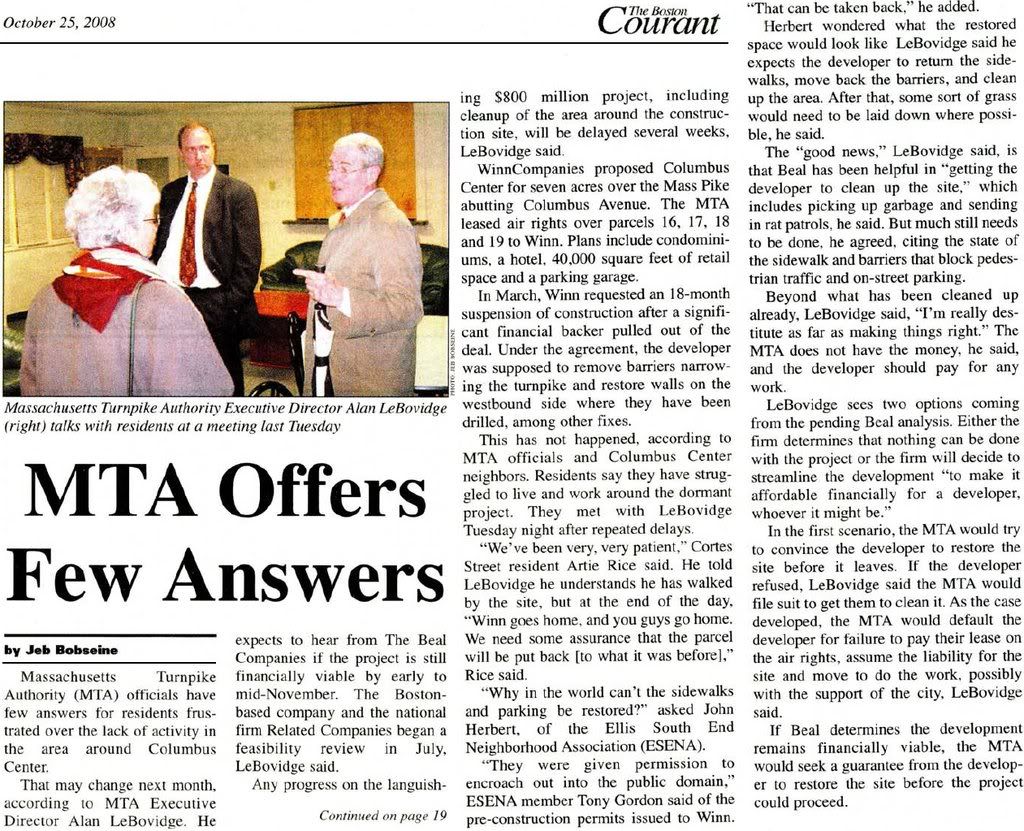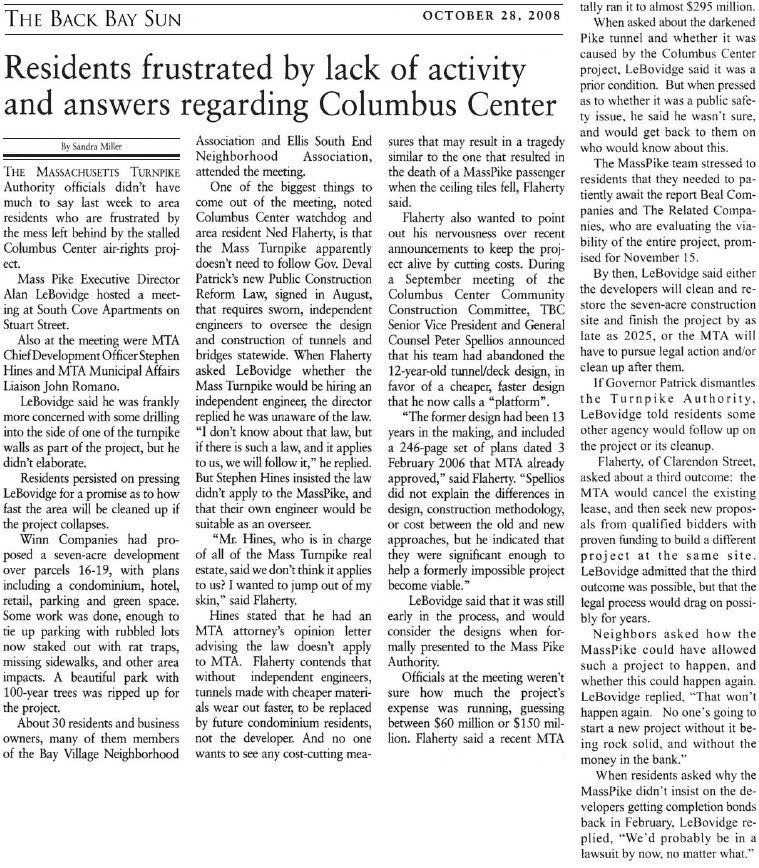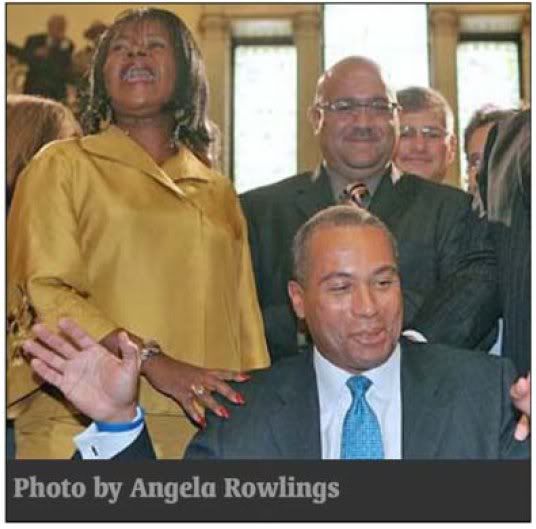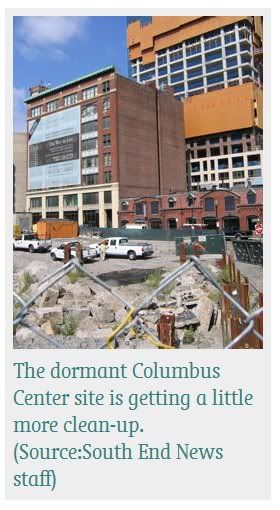JimboJones
Active Member
- Joined
- Apr 4, 2007
- Messages
- 935
- Reaction score
- 1
Re: Columbus Center
Defeated Columbus Center is an orphan with a thousand fathers
by John Keith, South End News Contributor
John Keith is a resident of the South End and a real estate broker. Read his blog at bostonREB.com. Matt Byrne contributed to this column.
Defeated Columbus Center is an orphan with a thousand fathers
by John Keith, South End News Contributor
An opportunity to stitch back together a deep tear in the urban fabric was lost with the failed Columbus Center project, the proposed $800 million, mixed-use complex to be built on decks constructed over the Massachusetts Turnpike. After 11 years of fits and starts, it appears to have fallen victim to its own lethargy, as much as anything else. It seems unlikely the development will ever be built.
How could this possibly happen? How could a project that was so far along in the process unravel at the last minute, after construction had already started?
There is plenty of blame to spread around, beginning with the company that first proposed the development.
It looks as though Arthur Winn and his WinnDevelopment never secured the money needed to complete the project. According to published reports, the developer missed two deadlines earlier this year by which it was supposed to have proved to the Massachusetts Turnpike Authority that it had raised $500 million (it did prove it had at least half that). But, trouble was brewing long before then.
Back in 1996, the developer proposed a subsidy-free project, but soon after it received its first approvals, it began reaching out for taxpayer money. Meanwhile, its financing began to fall apart. Major investor Anglo-Irish Bank withdrew more than $500 million in commitments as early as 2006. The next year, the real estate subsidiary run by investment partner CalPERS (now "owner of record" on the project and "leasee" of the Turnpike air rights lease) threatened to pull out unless the state guaranteed public assistance. In early 2007, the developers came to the state asking for help; but by April 2008, they hit a brick wall, failing to make it to round two in their quest for a $10 million MORE (Massachusetts Opportunity Relocation and Expansion) grant. Not long after, MassHousing, the state?s affordable housing agency, withdrew its promise of another $20 million. When asked, the city of Boston, which had already committed $14 million in incentives and tax credits, said, "No more."
Meanwhile, at the same time it was knocking on doors in search of funds, the developer faced a rapidly increasing budget, due to rising labor and material costs. The project had an estimated cost of $300 million when it was proposed in 1996, but that has ballooned to the now estimated $800 million. It sure didn?t help things when the credit crisis hit the commercial markets and residential real estate sales imploded.
If Mr. Winn had been able to pull things together, it would have been possible to ignore the constant drone of complaints from a small but vocal group of residents, neighbors and politicians, and we wouldn?t be having this conversation. But, he didn?t, it wasn?t, and we are.
The Columbus Center was more than just "luxury condos." It would have included a grocery store, daycare center, parking, and new parks - the result of promises extorted from the developer during the more than 130 public meetings held throughout the neighborhood over the past 10 years. In the final analysis, our friends and neighbors asked for too much - their constant meddling unnecessarily prolonged the approval process to the point it became economically unfeasible to build.
Blame also lies at the feet of our local elected officials. House Speaker Salvatore DiMasi, South End State Representative Byron Rushing and Back Bay State Representative Marty Walz each spoke out against public financing for Columbus Center, in effect dooming its chances to move forward. Ironically, at the same time they were expressing astonishment at the very idea of public funds going to a private company, they were supporting legislation that handed out millions (actually, billions) of dollars in subsidies to other projects across the Commonwealth.
For example, Reps. DiMasi and Walz approved $60 million in state spending and incentives to help "persuade" drug company Bristol-Myers Squibb to move to Massachusetts. They?ve both heaped praise on the Massachusetts film-credit incentive program, which the Department of Revenue estimates has cost the state $120 million over the past three years. And just this spring, all three voted in favor of the $1 billion life sciences bill, which authorizes $500 million in borrowed capital spending, an additional $250 million in grants, and another $250 million in tax incentives.
Yet, when it came to helping out someone in their own backyard, our representatives defied logic and suddenly clammed up and clamped down. It?s all well and good to argue against public subsidies on principle, but don?t pull it out as an excuse only when it?s politically expedient or personally beneficial.
What have residents lost, as a result of the project?s failure? Property tax revenues (eventually; the city had promised forgiveness of much of it during the first years), jobs, homes, parks, parking spaces and the conveniences of local shops, for starters. In addition, WinnDevelopment would have been required to include affordable-housing units as part of any new construction or make a significant financial payment into the city?s low-cost housing fund. These community benefits are all gone.
But, this is all water under the bridge, or decks, as it were. I, for one, have given up on the project. One small request, though. Mr. Winn, don?t feel any rush to clean up your construction site; please leave it as is - an enduring testament to the lost chances and broken dreams that define the development process in Boston in the 21st century.
John Keith is a resident of the South End and a real estate broker. Read his blog at bostonREB.com. Matt Byrne contributed to this column.

